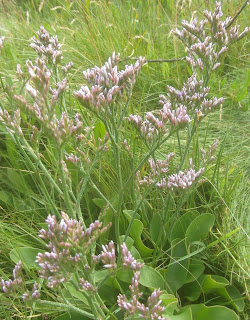A North American study suggests that bumble-bees are having their ranges restricted by the impact of global warming (http://www.nytimes.com/2015/07/10/science/bumblebees-global-warming-shrinking-habitats.html?_r=0). The suggestion is that these bees (that do not live in large colonies) are finding it difficult to move north as their flowers relocate in response to climate change. The plants would also suffer from the loss of important pollinators. The similar phenomenon would presumably apply to species being forced up mountainsides as eventually there is no where else to go.
This blog may help people explore some of the 'hidden' issues involved in certain media treatments of environmental and scientific issues. Using personal digital images, it's also intended to emphasise seasonal (and other) changes in natural history of the Swansea (South Wales) area. The material should help participants in field-based modules and people generally interested in the natural world. The views are wholly those of the author.
Friday, 10 July 2015
Bumble-bees Lose the Nectar Trail?
A North American study suggests that bumble-bees are having their ranges restricted by the impact of global warming (http://www.nytimes.com/2015/07/10/science/bumblebees-global-warming-shrinking-habitats.html?_r=0). The suggestion is that these bees (that do not live in large colonies) are finding it difficult to move north as their flowers relocate in response to climate change. The plants would also suffer from the loss of important pollinators. The similar phenomenon would presumably apply to species being forced up mountainsides as eventually there is no where else to go.
Making Hay in SW19?
Just heard a piece of dialogue in BBC Breakfast TV, suggesting that a man cutting the grass on Wimbledon's Centre Court was exacerbating the hay-fever of the court-side weather reporter. Given the repeated mowing over the tennis competition, I think it very unlikely that the grass gets anywhere near flower production. There might be some dust generated by the activity but clouds of grass pollen seem very unlikely.
Wednesday, 8 July 2015
Fish Farming Landed?
There has been some excitement about a project where workers at Rothamsted have successfully used GM technology to encourage greenhouse-grown Camelina plants to incorporate omega-3 fish oils into their seeds (http://www.rothamsted.ac.uk/alpha-omega-making-omega-3-fish-oils-gm-plants). Somewhat remarkably, there appears to have been very little by the way of a negative response from the anti-GM lobby. Although the oils could be extracted to supplement human diets (and reduce the need to get the same materials from fish), a more likely use, according to the scientists (involving Sterling University), is to see whether the seeds could replace some of the fish meal that is fed to their bigger cousins in fish farms. The argument is that this would reduce some of the pressures on our oceans and make fish farming even more sustainable. Having said that, quite a lot of fish meal is used as fertiliser for plant crops!
Tuesday, 7 July 2015
An Age Old Question
A study, conducted in New Zealand, has suggested that humans age at different speeds (http://www.theguardian.com/science/2015/jul/06/old-before-your-time-people-age-at-wildly-different-rates-study-confirms). Basically 1000 people were followed in their early and later 30's and measured on factors such as kidney efficiency, liver function, cardiovascular measures and lengths of chromosomal telomeres. It was found that people sometimes showed values that appeared to be those of a much younger or older individual. Interestingly, subjects that were 'physiologically older' than their chronological age were also poorer at tasks normally given to people in their 60's. People also guessed, on the basis of appearance, that they were older than was confirmed by their birth certificates. It remains, of course, to be determined whether some people's rate of ageing is determined by their genes or by life-style (or probably by a combination of these factors).
A Steak in the Future?
Recent studies have suggested that the onset of human dementia is linked to the age-related build up of a protein termed B2M (beta 2-microglobulin) and, unfortunately, this protein is especially likely to build up in patients undergoing kidney dialysis where memory loss can be a common side-effect (http://www.theguardian.com/science/2015/jul/06/memory-loss-in-old-age-breakthrough-offers-dementia-hope-say-researchers). Studies using mice in San Francisco have shown that subjects treated with B2M behaved in memory tasks like much older individuals whereas mice genetically modified not to produce this protein performed well into old age. This current focus on brain protein chemistry suggests that certain proteins are detrimental to memory whereas others can counteract the aging process. Perhaps hope for the (distant) future?
Monday, 6 July 2015
Subscribe to:
Posts (Atom)
Seeing the Changes 2183
Early ripening fruit may seem convenient but some folk think it confirms environmental stress. There's also a possibility th...

-
Early ripening fruit may seem convenient but some folk think it confirms environmental stress. There's also a possibility th...
-
It's necessary, where possible, to replace diesel and petrol-fueled vehicles by electrical equivalents. Electric vehicles (EVs) don...
















%20mating%20NWCW.jpg)